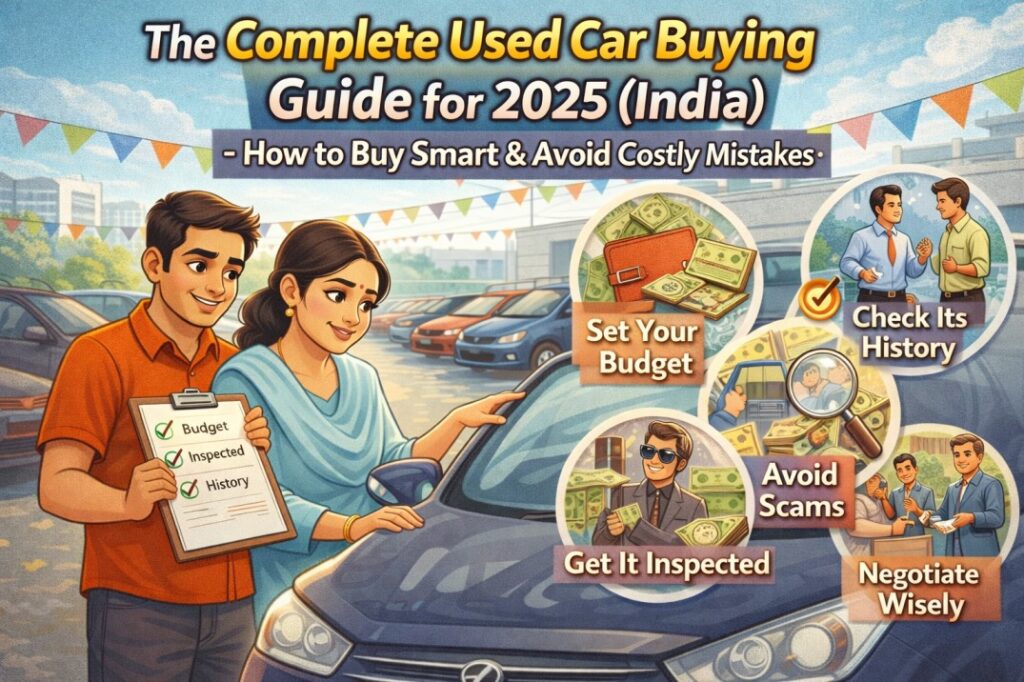Planning to buy a used car in 2025? This complete Indian guide covers inspection checklist, documents, pricing, loans, insurance, common scams, real-life stories, FAQs, and smart tips to save lakhs.

The Complete Used Car Buying Guide for 2025
Buying a used car in India feels simple—until it isn’t.
On paper, it looks like a great deal:
- Lower price
- Slower depreciation
- More car for your money
But in real life, many buyers end up with:
- Hidden accident damage
- Loan and RC headaches
- Unexpected repair bills
- Zero resale confidence
This guide is written to protect first-time and repeat buyers in 2025, using real Indian ownership realities—not sales talk.
If you read this once, carefully, you can save ₹50,000 to ₹3 lakh over ownership.
Why Used Cars Make More Sense Than Ever in 2025
The Indian car market has changed:
- New car prices are rising fast
- Waiting periods still exist
- Depreciation in year 1 is brutal
- Feature inflation increases cost
A 2–4-year-old car often gives:
- 70–75% of the price
- 90% of the usable life
That’s smart value—if you buy right.
Real-Life Story #1: The “Too Good to Be True” Deal
Ramesh from Kanpur found a diesel sedan listed ₹1.2 lakh below market price.
Seller story:
“Doctor-owned, rarely driven.”
Reality after purchase:
- Accident-repaired chassis
- Insurance claims hidden
- Steering alignment never correct
Repair + resale loss: ₹1.8 lakh
His lesson:
“Cheap used cars are never cheap.”
Step 1: Decide the Right Used Car for Your Life
Before browsing listings, answer honestly:
- City or highway use?
- Daily running (km)?
- Petrol, diesel, automatic?
- Parking space?
- Service support in your city?
Don’t buy based on:
- Brand hype
- Neighbour advice
- “Road presence”
👉 Helpful comparison:
Hatchback vs Sedan vs SUV – Which Is Right for You?
Step 2: New vs Used – Do the Math First
Many buyers think used saves money—but don’t calculate properly.
👉 Read this before deciding:
The Ultimate New Car Buying Guide for 2025
Used cars save money only when:
- Price gap is meaningful
- Car condition is verified
- Ownership costs are understood
Step 3: Where to Buy Used Cars (Pros & Cons)
1. Individual Sellers
- Cheapest option
- More negotiation room
- Highest risk
2. Dealers
- Easy paperwork
- Higher prices
- Variable honesty
3. Certified Platforms
- Warranty options
- Higher cost
- Better peace of mind
No source is perfect. Verification matters more than source.
Step 4: Mandatory Background Checks (Never Skip)
Accident History
Hidden accident repairs are common.
👉 Must-read:
How to Check a Car’s Accident History in India (2025)
VIN & Chassis Number
Confirms manufacturing year and authenticity.
👉 Learn how:
How to Read a Car’s VIN Number in India
Step 5: Physical Inspection Checklist (Indian Conditions)
Engine & Mechanical
- Cold start noise
- Smoke from exhaust
- Oil leaks
- Smooth idling
Suspension & Brakes
- Uneven tyre wear
- Knocking sounds
- Brake vibration
👉 Understand basics:
Understanding Car Brakes and Suspension
Electricals
- Warning lights
- Power windows
- AC performance
Real-Life Story #2: Saved ₹90,000 by Walking Away
Neha from Thane almost bought a compact SUV.
During inspection:
- Slight vibration at idle
- Seller said “normal diesel sound”
She walked away.
Two weeks later, same car appeared again—engine repair listed in description.
Her savings:
₹90,000 + lifelong regret avoided
Step 6: Documents You MUST Verify
Never rely on verbal assurances.
Checklist:
- Original RC
- Insurance policy
- Pollution certificate
- Service history
- Loan closure proof
- Form 29 & 30
RC transfer delays cause:
- Legal issues
- Insurance claim rejection
- Ownership disputes
Step 7: Used Car Price – How to Judge Fair Value
Factors affecting price:
- Age
- Mileage
- Condition
- Ownership count
- City demand
Avoid:
- Emotional attachment
- “Urgent sale” pressure
Always compare at least 3 listings.
Step 8: Used Car Loan – Be Extra Careful
Used car loans:
- Higher interest
- Shorter tenure
- Stricter checks
👉 Before taking loan, read:
Car Loan vs Personal Loan – Which Is Better?
Also calculate EMI properly:
How to Calculate Car Loan EMI
Step 9: Insurance for Used Cars (Most People Overpay)
Common mistakes:
- Accepting seller’s insurance blindly
- Not transferring NCB
- Overpaying for add-ons
👉 Learn how to save:
Save Money on Car Insurance
Myth vs Reality: Used Car Buying in India
| Myth | Reality |
|---|---|
| Used cars are risky | Bad checks are risky |
| Dealer cars are safer | Depends on verification |
| Low mileage = good car | Maintenance matters more |
| Accidents are always visible | Many are hidden |
| Used cars cost less overall | Only if chosen smartly |
Mistakes That Ruin Used Car Ownership
❌ Skipping inspection
❌ Ignoring service history
❌ Trusting verbal promises
❌ Buying emotionally
❌ Rushing paperwork
❌ Overlooking RC transfer
Used cars punish hurry.
They reward patience.
Editor’s Pick: Smart Used Car Buying Strategy (2025)
- Fix budget + 10% buffer
- Shortlist 2–3 models
- Verify history before visit
- Inspect in daylight
- Test drive at highway speed
- Verify documents personally
- Walk away if unsure
No deal is better than a bad deal.
FAQs (Used Car Buyers Ask This Daily)
1. What is the best age to buy a used car?
2–4 years old offers best value.
2. Is high mileage always bad?
No. Highway-driven cars age better.
3. Should I buy diesel used cars?
Only if usage is high and service history is clean.
4. Is extended warranty useful?
Yes, for complex cars and automatics.
5. How long does RC transfer take?
2–6 weeks, depending on state.
6. Can I trust online used car platforms?
More than unknown dealers—but still inspect personally.
7. What’s the biggest used car buying mistake?
Skipping background and document checks.
Final Words: Used Cars Reward the Informed Buyer
Used cars are not risky.
Ignorance is.
If you:
- Verify patiently
- Inspect carefully
- Calculate realistically
A used car can be the smartest automotive decision of your life.
Strong CTA 🚗
👉 Save this guide before visiting listings
👉 Share it with someone planning to buy used
👉 Explore more honest, India-first car buying guides on Car Insight Hub
Because the best used car isn’t the cheapest one—
it’s the one you don’t regret later.
Planning to buy a used car in 2025? This complete Indian guide covers inspection checklist, documents, pricing, loans, insurance, common scams, real-life stories, FAQs, and smart tips to save lakhs.
The Complete Used Car Buying Guide for 2025
Buying a used car in India feels simple—until it isn’t.
On paper, it looks like a great deal:
- Lower price
- Slower depreciation
- More car for your money
But in real life, many buyers end up with:
- Hidden accident damage
- Loan and RC headaches
- Unexpected repair bills
- Zero resale confidence
This guide is written to protect first-time and repeat buyers in 2025, using real Indian ownership realities—not sales talk.
If you read this once, carefully, you can save ₹50,000 to ₹3 lakh over ownership.
Why Used Cars Make More Sense Than Ever in 2025
The Indian car market has changed:
- New car prices are rising fast
- Waiting periods still exist
- Depreciation in year 1 is brutal
- Feature inflation increases cost
A 2–4-year-old car often gives:
- 70–75% of the price
- 90% of the usable life
That’s smart value—if you buy right.
Real-Life Story #1: The “Too Good to Be True” Deal
Ramesh from Kanpur found a diesel sedan listed ₹1.2 lakh below market price.
Seller story:
“Doctor-owned, rarely driven.”
Reality after purchase:
- Accident-repaired chassis
- Insurance claims hidden
- Steering alignment never correct
Repair + resale loss: ₹1.8 lakh
His lesson:
“Cheap used cars are never cheap.”
Step 1: Decide the Right Used Car for Your Life
Before browsing listings, answer honestly:
- City or highway use?
- Daily running (km)?
- Petrol, diesel, automatic?
- Parking space?
- Service support in your city?
Don’t buy based on:
- Brand hype
- Neighbour advice
- “Road presence”
👉 Helpful comparison:
Hatchback vs Sedan vs SUV – Which Is Right for You?
Step 2: New vs Used – Do the Math First
Many buyers think used saves money—but don’t calculate properly.
👉 Read this before deciding:
The Ultimate New Car Buying Guide for 2025
Used cars save money only when:
- Price gap is meaningful
- Car condition is verified
- Ownership costs are understood
Step 3: Where to Buy Used Cars (Pros & Cons)
1. Individual Sellers
- Cheapest option
- More negotiation room
- Highest risk
2. Dealers
- Easy paperwork
- Higher prices
- Variable honesty
3. Certified Platforms
- Warranty options
- Higher cost
- Better peace of mind
No source is perfect. Verification matters more than source.
Step 4: Mandatory Background Checks (Never Skip)
Accident History
Hidden accident repairs are common.
👉 Must-read:
How to Check a Car’s Accident History in India (2025)
VIN & Chassis Number
Confirms manufacturing year and authenticity.
👉 Learn how:
How to Read a Car’s VIN Number in India
Step 5: Physical Inspection Checklist (Indian Conditions)
Engine & Mechanical
- Cold start noise
- Smoke from exhaust
- Oil leaks
- Smooth idling
Suspension & Brakes
- Uneven tyre wear
- Knocking sounds
- Brake vibration
👉 Understand basics:
Understanding Car Brakes and Suspension
Electricals
- Warning lights
- Power windows
- AC performance
Real-Life Story #2: Saved ₹90,000 by Walking Away
Neha from Thane almost bought a compact SUV.
During inspection:
- Slight vibration at idle
- Seller said “normal diesel sound”
She walked away.
Two weeks later, same car appeared again—engine repair listed in description.
Her savings:
₹90,000 + lifelong regret avoided
Step 6: Documents You MUST Verify
Never rely on verbal assurances.
Checklist:
- Original RC
- Insurance policy
- Pollution certificate
- Service history
- Loan closure proof
- Form 29 & 30
RC transfer delays cause:
- Legal issues
- Insurance claim rejection
- Ownership disputes
Step 7: Used Car Price – How to Judge Fair Value
Factors affecting price:
- Age
- Mileage
- Condition
- Ownership count
- City demand
Avoid:
- Emotional attachment
- “Urgent sale” pressure
Always compare at least 3 listings.
Step 8: Used Car Loan – Be Extra Careful
Used car loans:
- Higher interest
- Shorter tenure
- Stricter checks
👉 Before taking loan, read:
Car Loan vs Personal Loan – Which Is Better?
Also calculate EMI properly:
How to Calculate Car Loan EMI
Step 9: Insurance for Used Cars (Most People Overpay)
Common mistakes:
- Accepting seller’s insurance blindly
- Not transferring NCB
- Overpaying for add-ons
👉 Learn how to save:
Save Money on Car Insurance
Myth vs Reality: Used Car Buying in India
| Myth | Reality |
|---|---|
| Used cars are risky | Bad checks are risky |
| Dealer cars are safer | Depends on verification |
| Low mileage = good car | Maintenance matters more |
| Accidents are always visible | Many are hidden |
| Used cars cost less overall | Only if chosen smartly |
Mistakes That Ruin Used Car Ownership
❌ Skipping inspection
❌ Ignoring service history
❌ Trusting verbal promises
❌ Buying emotionally
❌ Rushing paperwork
❌ Overlooking RC transfer
Used cars punish hurry.
They reward patience.
Editor’s Pick: Smart Used Car Buying Strategy (2025)
- Fix budget + 10% buffer
- Shortlist 2–3 models
- Verify history before visit
- Inspect in daylight
- Test drive at highway speed
- Verify documents personally
- Walk away if unsure
No deal is better than a bad deal.
FAQs (Used Car Buyers Ask This Daily)
1. What is the best age to buy a used car?
2–4 years old offers best value.
2. Is high mileage always bad?
No. Highway-driven cars age better.
3. Should I buy diesel used cars?
Only if usage is high and service history is clean.
4. Is extended warranty useful?
Yes, for complex cars and automatics.
5. How long does RC transfer take?
2–6 weeks, depending on state.
6. Can I trust online used car platforms?
More than unknown dealers—but still inspect personally.
7. What’s the biggest used car buying mistake?
Skipping background and document checks.
Final Words: Used Cars Reward the Informed Buyer
Used cars are not risky.
Ignorance is.
If you:
- Verify patiently
- Inspect carefully
- Calculate realistically
A used car can be the smartest automotive decision of your life.
Strong CTA 🚗
👉 Save this guide before visiting listings
👉 Share it with someone planning to buy used
👉 Explore more honest, India-first car buying guides on Car Insight Hub
Because the best used car isn’t the cheapest one—
it’s the one you don’t regret later.
Disclaimer: This article is published for general informational purposes based on research, observations, and owner experiences. It should not be considered professional, technical, or legal advice. Vehicle specifications, costs, and procedures may vary by model, location, and time. Readers are advised to verify details with official sources or qualified professionals before making decisions.






